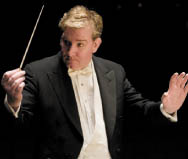|
Sunday, January 18, 2009
7:30 PM
 Alasdair Neale |
|
SYMPHONY
Marin Symphony
Alasdair Neale
A RISING STAR
CELLIST, DAVID REQUIRO DEBUTS WITH THE MARIN SYMPHONY
Last night, in keeping with spotlighting music composed for the dance during their 2008-2009 season, the Marin Symphony performed two well-chosen selections from Bela Bartok’s ballet, The Miraculous Mandarin. and Sergei Prokofiev’s Romeo and Juliet, Suite No. 1, Opus 64a. While these two works were performed superbly under the capable hands of conductor, Alaisdair Neale, the real spotlight last night was on the guest artist, cellist David Requiro.
Requiro, is a young rising artist of the first rank. He gave a sterling performance of Peter Tchaikovsky’s Variations on a Rococo Theme, Op. 33, and despite his age—he’s 23 years old--Mr. Requiro is clearly a mature performer. This Oakland, California native has already won numerous competitions, including the prestigious Naumburg Competition in 2008. His performance of Tchaikovsky’s Variations—a work from the standard repertoire--was glorious. One felt drawn-in with his artistry and his effortless playing, the mark of a superb and mature artist. Although a microphone had to be placed in front of his cello in order for him to be heard throughout the cavernous Marin Civic Auditorium, there was nothing wrong with his intonation, his superb phrasing, or his flawless technique. Even the very high tones on his instrument were heard in the very back rows of the large auditorium. The packed audience listened with rapt attention, hardly moving throughout the duration of this 30 minute plus Tchaikovsky masterpiece. The orchestra’s accompaniment was beautifully balanced throughout Mr. Requiro’s performance.
Requiro’s performance of the Tchaikovsky Variations was framed around Bartok’s, The Suite from The Miraculous Mandarin, an edgy, brash, and dissonant work that Bartok composed in 1918. Calling his work a “grotesque pantomime,” Bartok chose to depict a tale of urban depravity meeting with supernatural lust. Although Bartok’s suite is performed more often than the entire ballet, Maestro Neale gave a short talk about the ballet’s story and the music the audience would soon hear, a welcome explanation to this infrequently performed work.. Special mention must go to the woodwind and brass section’s masterful playing of this work.
Prokofiev’s, Suite No. 1 from Romeo and Juliet, Opus 64a is perhaps one of the composer’s most famous compositions. It is difficult to understand that this Suite, now considered to be one of the composer’s most often performed works, was once declared impossible to dance. Composed in 1935-36, Prokofiev’s work is now in practically every symphony orchestra’s repertoire. The Suite the Marin Symphony performed last night was comprised of music mostly from the second act of Prokofiev’s ballet. Seven different dances were performed with the added addition of two excellent ballet dancers from the Smuin Ballet troupe. Dancers Erin Yarbrough-Stewart and Aaron Thayer performed the Romeo and Juliet dance with the orchestra’s accompaniment. Again Maestro Neale led the orchestra in this beautiful Prokofiev work with fine support. The last movement, Death of Tybalt, was particularly stirring and climatic. It was a moving climax to an excellent and entertaining concert.
Marin Veterans' Memorial Auditorium, Marin Center
Avenue of the Flags
San Rafael, California 94903
415.479.8100
www.marinsymphony.org
|